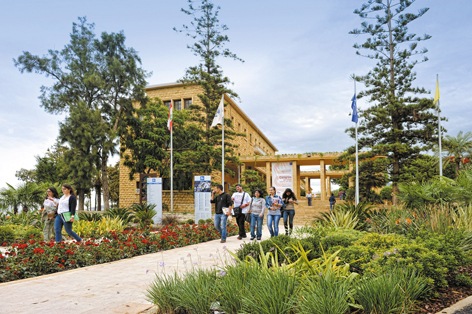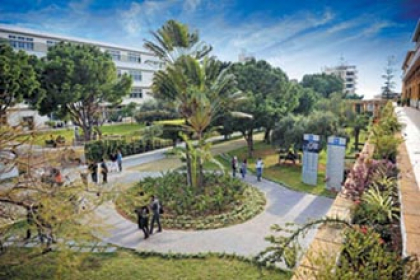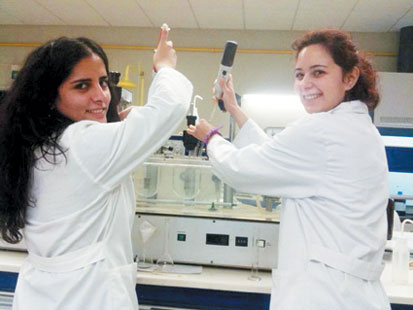Biomedical Engineering at Holy Spirit University of Kaslik
Written by: Sandy RIHANA, Eng, PhD
Biomedical Engineering Department
Mission The Biomedical Engineering Department “Medical Imaging and Instrumentation” prepares students for rewarding careers in the health care industry or in pursuing continued education in biomedical research or even in medicine.
The department offers supplementary courses within biomedical engineering, augmented by targeted electives in other engineering departments.
The department mission is to prepare rigorously the students in the diverse fields of biomedical engineering, building a strong foundation in engineering, technology, biophysics, chemistry, mathematics and biology.
1. To apply fundamental knowledge of engineering, physics, chemistry, biology to solve problems in pluridisciplinary environment that bridge the gap between technology and life sciences and medicine.
2. To prepare professionals to work
cooperatively on multi-disciplinary teams and an ability to communicate with medical professionals, technicians and engineers.
3. To ethically lead with innovation and
contribute to the development of Lebanon and the middle-east while considering contemporary issues and their implications to health, medical and clinical engineering practice.
4. To succeed in lifelong learning programs to remain up-to-date professionals to respond and accompany clinical and technological advancements and real world demands within realistic constraints.

Biomedical Engineering Curriculum: Quality triangle objectives
What are the Biomedical engineering curriculum objectives?
Based on the quality triangle, a balanced curriculum should meet the education and university academic rigor with the industry market and the real applied applications fulfilling thus the learning objectives.
a-Education and University Academic Rigor
The Biomedical Engineering Department at Holy Spirit University of Kaslik is based on providing to the students the best of the education and academic rigor. The curriculum is compatible with international standards in Engineering curriculum.
The courses and laboratories respectthe BLOOM’s taxonomy in the learning process. The student entering the university after the high school should be able to remember, understand and deepen the understanding of the core concepts progressively leading this to higher order thinking process such analyzing, evaluating and finally creating.
Moreover, the curriculum isvery well organized. In fact, a typical track is proposed on the students and for each course a specific syllabus based on a defined textbook and supplementary materials are provided.
The Biomedical Engineering Department believes in the involvement of the students in the learning process. Therefore, applied projects, based on hardware and software design, are given to the students.
These projects are result-driven and divided into different milestones where the students learn team work and product management through the whole process.
Finally the variety of strategies and resources and as straight example the variety of background of the faculty members that fit the pluridisciplinary of the biomedical engineering curriculum is an asset. Indeed, the faculty members are highly skilled persons coming from different background such as scientists (physiologists, medical physicists), technical biomedical/electrical engineers, application engineers, professors, researchers and clinicians. And the culminant and final pointwould be the collaborations with industries, hospitals, research centers and clinicians.

b-Industry and market best practice
The Biomedical Engineering Department at Holy Spirit University OfKaslik offers a high quality education program suitable for national, regional and international market in the field.
In Biomedical Industries: the biomedical engineer is in charge of designing, manufacturing, marketing and maintaining equipment that require a good knowledge of living systems, as well as scientific, engineering and technical skills.
In Hospitals or Clinics: The biomedical engineer is the equipment Manager, in charge of managing the choice and utilization of equipment. The Biomedical Engineer oversees the performance and maintenance of the material and supervises a team of technicians.
In Service Companies and Supervisory Bodies: the biomedical engineer plays as an advisor for Health Institutions;he supervises the equipment of hospitals and clinics, in order to maintain its high quality. Furthermore, he/she ensures that the establishment’s equipment conforms to safety standards within the health area.
Besides the technical, scientific, engineering skills, the Biomedical Engineering Department prepares the engineers to soft skills required in the market. Several courses and projects sculpt the students with excellent communication skills, project management and business development.
Biomedical Engineering in the 21th century
In April 2011, the New York Times called biomedical engineering the number one new job of the coming decade, way ahead of such other in-demand jobs…
“…there are multiple reasons for the growth of biomedical engineering, not the least of which is the codification of the biomedical engineering category itself. “Industry has been hiring electrical engineers for years, but now the field is becoming defined under its specific name”.
The other factor affecting the industry’s growth is the rapid development of medical technology and the aging population that technology serves. “With the growth of the healthcare budget, more money is constantly going to medical devices”
Sandy RIHANA
Associate Professor, Chairperson
Biomedical Engineering Department
IEEE-EMBS Lebanon Chapter Industry Liasion Officer
Holy Spirit University OfKaslik, USEK, Jounieh, Lebanon
+961.9.600.948






















